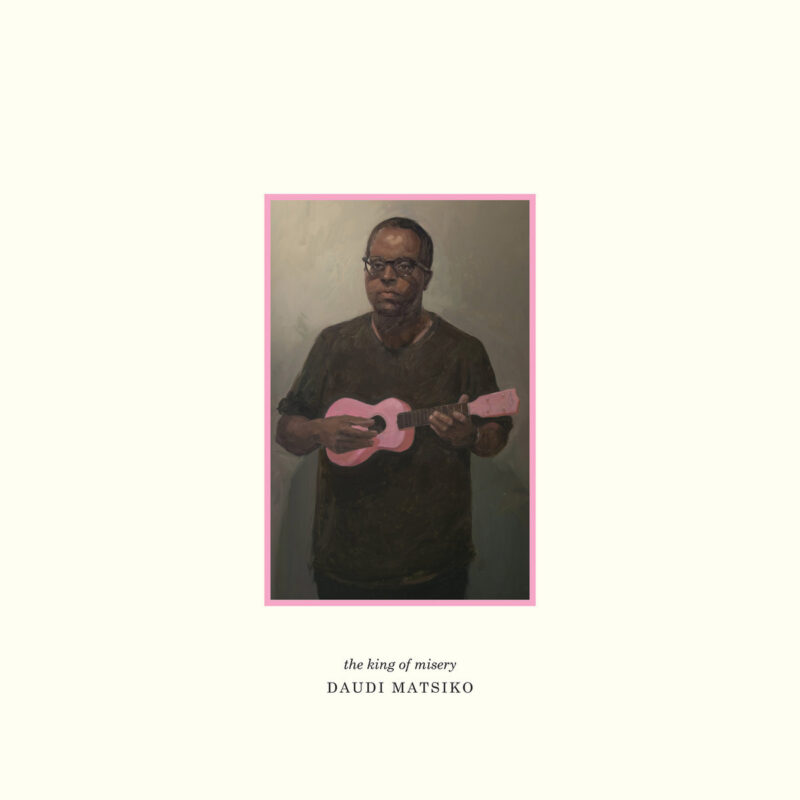RUDI RANCE reviews Daudi Matsiko’s debut album The King of Misery.
It begins with a whispered, confessional falsetto carried in on the back of a barely strummed guitar. Winding, hypnotically finger-picked chords build slowly—waves upon a shore, crashing back into themselves, too delicate to build to anything bigger. This opening track aptly named ‘Guilt’ is quite the tone-setter. As a steady synth drone begins to grow, painting the song grey, the nature of the work becomes clear. What is here is deeply tender, delicate, and honest. The title is apt. This is sad music.
Welcome to the court of the ‘King of Misery’.
Hailing from Nottingham, British-Ugandan musician Daudi Matsiko returns with his debut album: a collection of delicate, beautiful, and brutal folk songs. This is familiar territory for Matsiko; since emerging on the scene in 2014 with his debut EP A Brief Introduction to Failure and its subsequent, less brief sister record, An Introduction to Failure, the singer-songwriter has carved himself out a cosy (Nick) Drakian corner comprised of haunting, melancholic guitar lines and a deeply confessional lyricism.
Following a series of acclaimed shows across the summer of 2023, Matsiko has been steadily gaining traction, culminating in the release of his latest effort The King of Misery. Having been a fan of Matsiko’s previous work, I was excited to dig into the album, hoping for a mature development of the soft, slow, and textured songs found on his previous EP, such as the excellent ‘Home’. The end result is a worthy, albeit limited, ode to dark woodland balladry.
A standout amongst the songs on display is the deeply moving ‘I Need You To Stop Calling My Phone’. The track opens with the roar of a deathly, medieval drone—a soundtrack to dread—pouring in through the speakers. Fade into a spare sonic clearing, only the faint, repetitive strumming of guitar remaining, over which Matsiko in typical hushed delivery, begins to sing. From this minimalism grows a devastating mix of ethereal piano and smoke-filled saxophone punctuating the rising and falling of a slow croon. Violin simmers in the corner, basslines descend towards an inevitable end. The effect is akin to that of a final breath, a shimmering airy goodbye that pulls you kicking and screaming, deep into the pit of Matsiko’s ‘Misery’.
Matsiko is at his best when at his most playful. Despite the pervasive melancholy on display, songs such as ‘Falling’, a concise and cute folk love song, offer a melodic brevity that provides balance and measure to the tracklist. Breathless vocals are scored by a chord sequence that dances from dissonance to bliss and back again. It’s the noise of heartbreak. As Matsiko admits that he ‘Has always been falling’, the bittersweet pain of love persisting is painted in technicolour. Other songs struggle to maintain this balance and consequently comes across as structureless and confused. ‘Fool Me as Many Times as You Like’ features a beautiful saxophone passage yet is melodically lacking and repetitive in its lyrical content. As a result, Matsiko’s often endearing, bleeding-heart sincerity seems somewhat overcooked.
Matsiko is a minimalist—no doubt about it—but at times I find myself questioning whether this is due to a limited technical ability rather than legitimate artistic impulse. I expect the truth is found somewhere in the middle. Certain tracks lack the drive provided by a greater instrumental structure and struggle under the weight of Matsiko’s largely fantastic lyricism. Interested in the interplay between the unsaid and blatant, he pairs the blunt and cringe with the painful and confessional. The result is a strikingly honest poeticism that bites at the heart of the listener.
Daudi Matsiko more than proves his worth on this album, yet I feel disappointed at the lack of scope held by the project. Then again, it is called The King of Misery. Sadness can only provide so much.
The King of Misery will be available for listening on most streaming platforms tomorrow Friday, January 19.
Featured Image courtesy of Spotify.





